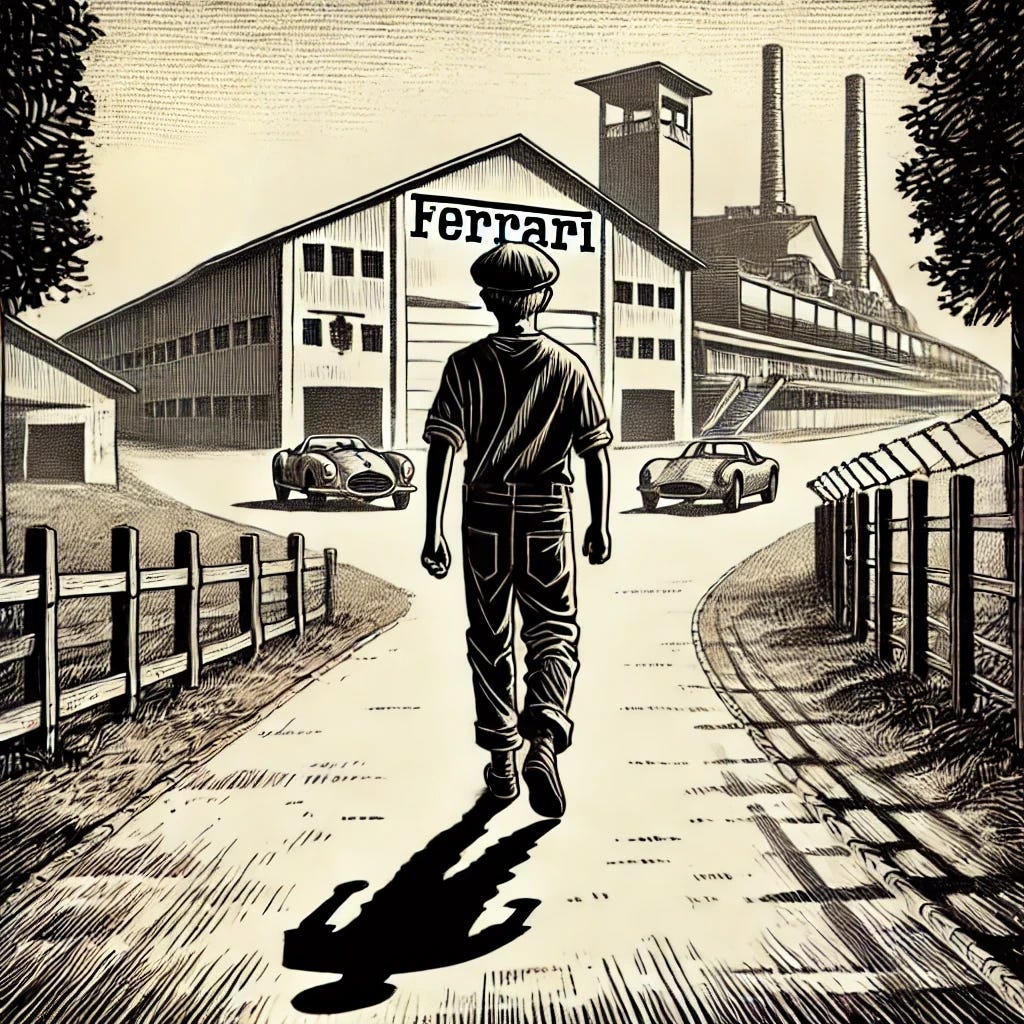At Fiorano, where the wind carries echoes of engines past, they still speak of prophecies. Here, where Enzo once stood with his chronograph, watching his creatures lap after lap, they understand the weight of names.
Ferrari is more than a marque; it is a repository of dreams, each driver adding his chapter to an eternal story.
And so it was that when young Leclerc arrived, carrying a name bestowed by destiny itself—Il Predestinato—the old guard nodded knowingly.
They had seen such omens before.
To understand Leclerc, one must first understand Monaco, that theatre of absurdity where apartment buildings kiss the racing line and every balcony holds a memory of engines at full song. Here, in this crucible of motorsport, a boy learned to dream in rosso corsa. His father, Hervé, would lift him high above the barriers, pointing to the scarlet cars that passed beneath their apartment, their song a siren call that would shape a destiny.
The story might have ended there, like so many others, a child's dream dissolving in the harsh light of reality.
But fate, that most Italian of dramatists, had other plans.
Jules Bianchi, himself marked for Ferrari glory, saw in young Charles something that transcended the ordinary metrics of talent. When resources ran dry, when the dream teetered on extinction, Bianchi spoke to Nicolas Todt. In that moment, without knowing it, the prophecy began its slow march toward fulfillment.
At fifteen, in a Sky Italia studio, the boy revealed himself. Asked about yielding to a teammate's championship ambitions, he answered with the kind of certainty that makes veterans smile and destiny take notice. "I drive to win," he said, not with arrogance but with the simple clarity of one stating natural law.
When pressed, he did not retreat into diplomatic niceties but rather corrected the premise itself—how could there be a question of yielding when he would be the one fighting for the title? Carlo Vanzini, hearing this, gave him the name that would become both crown and cross: Il Predestinato.
But destiny, as we in Italy know too well, demands its tribute in pain.
Hervé Leclerc would not live to see his son in Ferrari red.
Jules Bianchi, that bright star of promise, would be taken by the cruel hand of fate at Suzuka.
The path to Maranello, it seems, must always be walked through shadow.
Yet in the paddock, where every gesture is analyzed and every word weighed, Leclerc moves with a grace that defies his years. The mechanics speak of his dedication in reverent tones. Like Schumi, they say, and in Maranello, there is no higher praise. Fred Vasseur, who has watched him grow from boy to man, speaks not of talent but of character: "He never seeks excuses. When he makes a mistake, he comes to my office before I call him."
In thirty-four years of following the Scuderia, I have seen drivers come and go, each leaving their mark on our collective heart. But none since Schumacher has worn the red with such natural belonging as Charles.
Through Schumi and Räikkönen, through Alonso and Vettel, we tifosi have always held our private preferences, knowing that such choices do not diminish our love for Ferrari itself. Those who claim we cannot have favorites have never truly understood what it means to live and breathe with this team through decades of triumph and heartbreak.
But with Charles, the distinction b l u r s.
His story is their story: passion tempered by loss, promise shadowed by setback, yet always, always, that unwavering belief in tomorrow.
At Monza in 2019, when he stood on the podium and faced the sea of red below, it seemed for a moment that the prophecy had been fulfilled. But destiny, like the perfect lap, is an asymptotic pursuit—always approaching, never quite reached. Each pole position now is received not with surprise but with recognition; each setback not as failure but as another test of faith.
In the simulator at Maranello, long after others have departed, Leclerc pursues perfection with monastic dedication. This is not the behavior of one who believes destiny alone will deliver glory. Rather, it is the work ethic of one who understands that even Il Predestinato must earn his crown.
And so the story continues, lap after lap, race after race. In a sport where mythology and technology dance an eternal waltz, Charles Leclerc carries not just his own dreams but the weight of prophecy itself. For us who have lived through too many seasons of "next year," there would be a peculiar poetry in seeing him—the one who stayed, who suffered, who never wavered—be the one to end our long wait. For when that moment comes, whether it takes seventeen years or more, it will mean more because it was earned through unwavering loyalty, not just talent.
This is the true meaning of Il Predestinato—not one chosen by destiny, but one who chose destiny itself, who walks the corridors of Maranello not as an heir to greatness but as its architect.
In the end, perhaps that fifteen-year-old boy understood something we are only now beginning to grasp: that destiny is not what happens to us, but what we dare to make happen.






Beautiful, thank you!
Amazing piece. Perfectly said. Grazie Vincenzo!